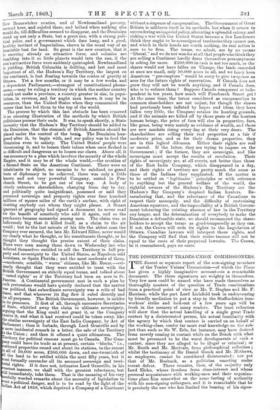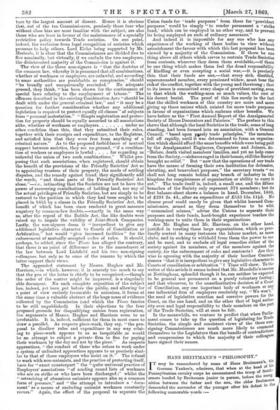THE DISSENTIENT TRADES-UNION COMMISSIONERS.
THE dissent or separate report of the non-signing members of the Trades' Unions' Commission—of which the Times has given a highly imaginative account—is a remarkable document. The three signatures are weighty in themselves. Very few men could be named who have made themselves as thoroughly masters of the question of Trade combinations from a practical point of view as Mr. T. Hughes and Mr. F. Harrison, while the part Lord Lichfield took in endeavouring by friendly mediation to put a stop to the Staffordshire ironworkers' strike and lock-out of a few years ago will be fresh in the memory of many readers. The least reflection will show that the actual handling of a single great Trade contest by a disinterested person, his actual familiarity with the agency by which that contest is carried on on behalf of the working-class, confer far more real knowledge on the subject than such as Sir W. Erie, for instance, may have derived from merely coming in contact while on the Bench with what must be presumed to be the worst developments of such a contest, since they are alleged to be illegal or criminal ; or Mr. Booth and Mr. Merivale, from philosophical reflection ; whilst the testimony of Sir Daniel Gooch and Mr. Mathews, as employers, cannot be considered disinterested ; nor yet that of Mr. Roebuck, as a politician smarting under recent defeat. There remains, then, of the majority only Lord Elcho, whose freedom from class-interest and whose personal acquaintance with working-men and their organizations place him somewhat on the same footing of authority with his non-signing colleagues, and it is remarkable that he is precisely the one who has limited the bearing of his signa
ture by the largest amount of dissent. Hence it is obvious that, out of the ten Commissioners, precisely those four who without class bias are most familiar with the subject, are also those who are least in favour of the maintenance of a specially restrictive policy towards Trade societies. On one point, indeed, the exclusion from legal recognition of societies which presume to help others, Lord Elcho being supported by Mr. Merivale, it is clear that the Commissioners are divided five to five nominally, but virtually, if we exclude the two employers, the disinterested majority of the Commission is against it.
The view of the three non-signers is "that the doctrine of the common law, whereby it is presumed that all combinations, whether of workmen or employers, are unlawful, and according to some authorities are punishable as conspiracies," should "be broadly and unequivocally rescinded." No adequate ground, they think, "has been shown for the continuance of special laws relating to the employment of labour." The offences described in the existing Combination Acts "should be dealt with under the general criminal law," and "it may be a question for further consideration whether any additional legislation is required to protect equally all classes" of subjects from "personal molestation." "Simple registration and protection for property should be equally accorded to all associations alike, whether of workmen or employers under no other condition than this, that they submitted their rules, together with their receipts and expenditure, to the Registrar, and satisfied him that they were free from anything of a criminal nature." As to the proposed forbiddance of mutual support between societies, they see no ground, "if a combination of workers or employers is lawful . . . . for regarding as unlawful the union of two such combinations." Whilst proposing that such associations, when registered, should obtain the benefit of the provisions of the Friendly Societies' Act as to appointing trustees of their property, the mode of settling disputes, and the remedy against fraud, they significantly add the words, "and those parts of the Friendly Societies' Act alone,"—i.e., intimating that the Societies are not to have the power of recovering contributions, of holding land, nor any of the actual privileges of Friendly Societies, but are simply to be restored to the position in which they had been sought to be placed in 1855 by a clause in the Friendly Societies' Act, the benefit of which has been since rendered in great measure nugatory by common-law doubts,—exactly in the same way as, after the repeal of the Bubble Act, the like doubts were raised up to impair the validity of Joint-Stock Companies. Lastly, the non-signers deem it "inexpedient to give any additional legislative character to Courts of Conciliation or Arbitration," but would "give increased facilities" for the enforcement of mutually accepted codes of rules. It should, perhaps, be added, since the Times has alleged the contrary, that there is no point of difference as to the amendment of the law between Lord Lichfield and his two non-signing colleagues, but only as to some of the reasons by which the latter support their views.
The appended statement by Messrs. Hughes and Mr. Harrison, —in which, however, it is scarcely too much to say that the pen of the latter is chiefly to be recognized,—though the order of the matter might be improved, is a singularly able document. No such complete exposition of the subject has, indeed, yet been put before the public, and allowing for a point of view entirely favourable to unionism, it forms at the same time a valuable abstract of the huge mass of evidence collected by the Commission (and which the Times fancies to be still unpublished). In their objections to the four proposed grounds for disqualifying unions from registration, the arguments of Messrs. Hughes and Harrison seem to us irrefutable. It is, indeed, sufficient for them in most cases to draw a parallel. As respects piece-work, they say, "the proposal to disallow rules and expenditure in any way relating to piece-work appears to us as inequitable as would be an attempt to subject a private firm to fine for paying their workmen by the day and not by the piece." As respects apprentices, "the conduct of those who refuse to work under a system of unlimited apprentices appears to us precisely similar to that of those employers who insist on it." The refusal to work with non-unionists, and the practice of protecting itself, have for "exact counterpart" the "quite universal practice of Employers' associations "of sending round lists of workmen who are on strike or who have been discharged ;" whilst the "ostracizing of obnoxious unionists appears also as a common form of pressure," and "the attempt to introduce a 'document' as a means of excluding unionist workmen constantly recurs." Again, the effect of the proposal to separate the
Union funds for 'trade purposes' from those for 'provident purposes' would be simply "to render permanent a strike fund,' which can be employed in no other way, and to prevent its being employed on ends of ordinary assurance."
And indeed it is impossible for any one who has any experience of the working of these bodies to view without astonishment the favour with which this last proposal has been viewed by a majority of the Commission. If there be one thing above all others which serves to restrain Trade Societies from contests, wherever they deem them avoidable,—if there be one thing which makes them feel the dread responsibility of kindling or even accepting a social war,—it is precisely this, that their funds are one,—that every sick, disabled, superannuated member, every pensioned widow, must bear the risk of the conflict, together with the young and the strong ; that to its issues is committed every shape of provident saving, even to that which the working-man so much values, the cost of his decent burial. The proof of this lies surely in the fact that the skilled workmen of this country are more and more giving up those unions which existed for mere trade purposes in favour of organizations which embrace other benefits. We have before us the "First Annual Report of the Amalgamated Society of House Decorators and Painters." The preface to this shows that although the local Societies in the trade, some of long standing, had been formed into an association, with a General Council, "based upon pirely trade principles," the members fell off rapidly, until it was determined to form an organization which should afford the same benefits which were being paid by the Amalgamated Engineers, Carpenters and Joiners, &c. "Before, death visited members' families, and yet no help came from the Society,—sickness raged in their homes, stillthe Society brought no relief." But "now that the operations of our trade have the means of forming their own institution for defensive, elevating, and benevolent purposes," the secretary trusts "we shall not long remain behind any branch of industry in the kingdom for completeness of organization or ability to carry it out." The trade itself is, indeed, a small one, and the fifteen branches of the Society only represent 374 members ; but its first balance-sheet shows a balance in hand, December, 1868, of £291 2s. 4d., after an expenditure of £553 13s. 11-id. No clearer proof could surely be given that whilst learned Commissioners, armed as they deem themselves to be with "economical science," advise the Unions to separate their purposes and their funds, bard-bought experience teaches the working-men to unite them in their organizations.
Are Mr. Hughes and Mr. Harrison, on the other hand, justified in treating these large organizations, which so practically control in many instances the labour market, as mere clubs, and in seeking to withhold from them the power to sue and be sued, and to exclude all legal remedies either of the society against its members, or of the members against the society, for the enforcement of rules and contracts V Are they wise in agreeing with the majority of their brother Commissioners "that it is inexpedient to give any legislative character to Courts of conciliation or arbitration" I Time will show. To the writer of this article it seems indeed that Mr. Mundella's success at Nottingham, splendid though it be, can neither be expected to be general nor permanent on a purely voluntary foobng and that whenever, to the unauthoritative decision of a Court of Conciliation, any one important body of workmen or gni, one influential firm of employers resolutely say, "We won t, the need of legislative sanction and coercive powers for the Court, on the one hand, and on the other that of legal authority over and legal responsibility to their members on the part of the Trade Societies, will at once be felt. In the meanwhile, we venture to predict that when Parliament comes to take up the question of legislating for Trade Societies, the simple and consistent views of the threenonsigning Commissioners are much more likely to comm. .end themselves to the Legislature than the bundle of contradictions and compromises to which the majority of their colleagues have signed their names.



































 Previous page
Previous page